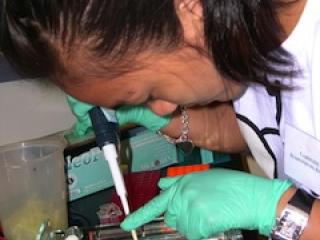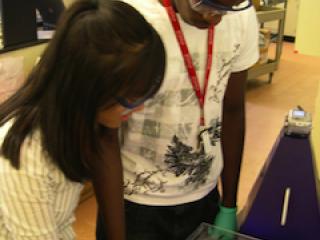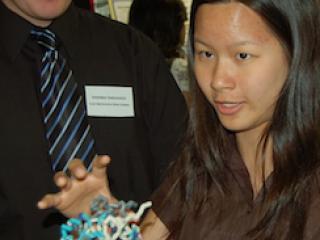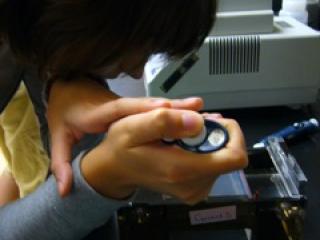The Waksman Student Scholars Program (WSSP) provides opportunities for high school students and their teachers to conduct an authentic research project in molecular biology and bioinformatics and publish their findings. This is a year-long program that begins each year with summer Institutes for teachers and one or two of their students. It continues back at each high school during the academic year, when more students can become involved in the research project in either a class or club setting. In the course of these studies, students, teachers, and research scientists work together on a genuine research problem. By actually doing science, students gain an understanding of how science operates and are encouraged to continue their education and careers in a science discipline. A video of an overview of the WSSP can be found here.
Access to the files and videos on this web site requires the username and password you used to register on DSAP. If you are participating in the 2025-2026 WSSP please use the 2025-2026 WSSP Project version of DSAP to log in. Students participating in one of the WISE programs should go to the WISE site to log onto the proper DSAP.
The Waksman Student Scholars Program (WSSP) is a year-long program that begins each year with summer Institutes for high school science teachers and one or two of their students. It continues back at each high school during the academic year when more students can become involved in the research project. Since its inception in July 1993, over 250 high school science teachers and over 15,000 high school students have worked on scientific research investigations with instruction from WSSP faculty and staff.
Each year-long WSSP research project explores basic concepts and relevant themes in molecular biology, bioinformatics, and computational biology using the resources found on the Internet. Students use molecular biology laboratory protocols (DNA purification, PCR, restriction digests, and agarose gel electrophoresis) to isolate and analyze DNA samples. These DNA samples are sequenced and students determine if the sequences are similar to genes from other organisms using bioinformatic programs and accessing databases that are used daily by practicing research scientists. Since the DNA sequences from these genes have never before been determined, students' analyses are of interest to other scientists. Novel findings are published on GenBank, the international repository of all known DNA sequences. Each published sequence bears the student's name and his/her teacher's name. An example of a published sequence report can be found here.
In the course of these studies, students, teachers, and research scientists work together on a genuine research problem. By actually doing science, students gain an understanding of how science operates and are encouraged to continue their education and careers in a science discipline.
Over the years the WSSP has received financial support from the National Science Foundation (NSF), National Institutes of Health (NIH), the Howard Hughes Medical Institute (HHMI), GE Healthcare Life-Science, the Amersham Corporation, Merck & Company, the Merck Foundation, the Toshiba America Foundation, and the Johnson & Johnson Foundation. The WSSP has received reagents and services from GE Healthcare Life-Sciences, Life Technologies, Rutgers University, Johns Hopkins University, Lawrence Livermore National Laboratories, and the Waksman Institute at Rutgers University.
Connect here for more information for Teachers interested in the program
Connect here for more information for Students and Parents interested in the program
Protection of Minors Policy
The University has adopted a Protection of Minors Policy to promote the well-being and safety of minors who participate in programs or activities run by or associated with Rutgers. The policy includes requirements relating to reporting suspected abuse or neglect of minors, completing relevant online training, and undergoing background checks for Authorized Adults and people in Direct Contact Positions as defined by the policy. The WSSP programs are run in a manner consistent with the guidelines of the University’s Protection of Minors Policy and the Guide to Working with Minors.
For more information, please visit https://protectminors.rutgers.edu.




